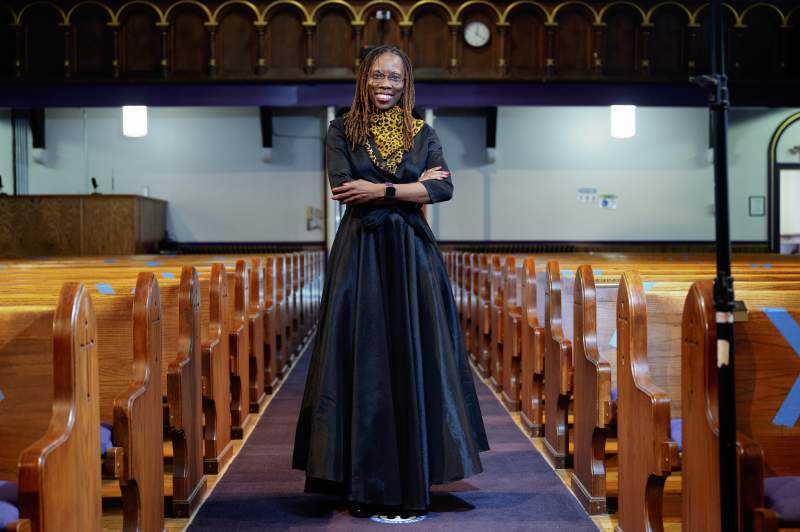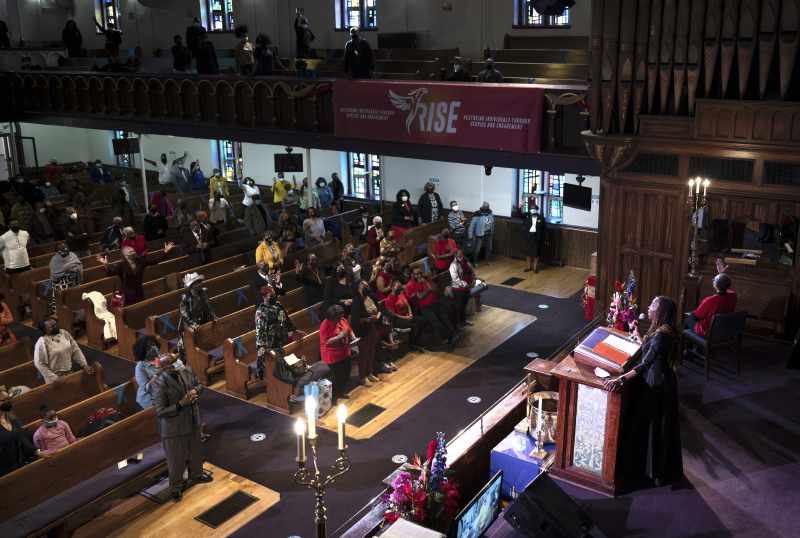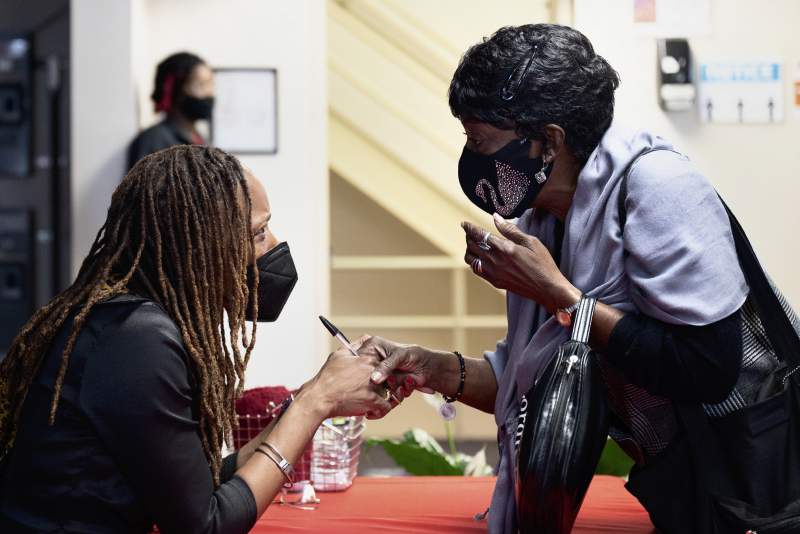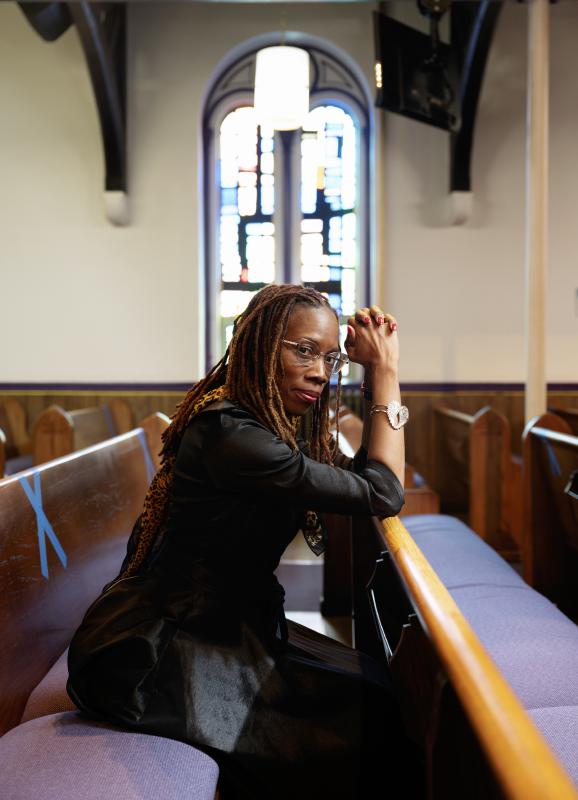
Thema Bryant is shown at Bethel AME Church in Baltimore, Md, on March 20, 2022.
11:56 JST, March 28, 2022
BALTIMORE – The day after the American Psychological Association’s newest leader pitched her vision for the organization to dozens of her colleagues in D.C., she walked into Maryland’s oldest Black church and stepped up to the wooden pulpit where her father and grandfather used to preach.
“Hallelujah,” Thema Bryant, 48, said, smiling as her voice boomed through the century-old sanctuary at the Bethel AME Church in West Baltimore. “It’s good to be home.”
Bryant, who was elected in December to lead the nation’s largest organization for psychologists, grew up in these pews. It was here she first met people who were hurting – from racism, gun violence, addiction – and saw how they could recover.
“You all raised me,” Bryant said, addressing the all-Black congregation for the first time since the pandemic started. “And let me tell you, I’ve not forgotten.”
A tenured professor at Pepperdine University in Los Angeles, Bryant is an ordained elder in the African Methodist Episcopal Church, an outspoken survivor of sexual assault, a daughter to two ministers and a sister to a popular Georgia pastor who recently went on a hunger strike for voting rights. She spent part of her teenage years in Liberia, where she witnessed the start of its first civil war.

Thema Bryant gives a sermon in the church she grew up in, at Bethel AME Church in Baltimore, Md, on March 20, 2022.
Bryant represents a different future for psychology, her colleagues say, at a turning point for the field where both providers and recipients of care have long been disproportionately White.
President Joe Biden recently pledged more mental health support for “Black and Brown communities” devastated by the pandemic, though a rash of high-profile suicides over the last year suggests the issue is deeper and more intransigent than officials anticipate. Even before the pandemic, rates of suicide were rising among Black adolescents faster than any other racial or ethnic group. Demand for culturally sensitive and accessible mental health services has surged in the face of worsening depression and anxiety among Black and Latino people, though according to 2019 census data, fewer than one in five psychologists are people of color and fewer than one in 30 is Black.
Those pushing to remake the field see Bryant as a key figure with potential to make a tangible difference.
She has spent her career studying trauma recovery and was among the first psychologists to assert, about two decades ago, that racism can be traumatic. She’s unapologetic about working outside staid conventions, whether that means breaking out in song while delivering keynote speeches, talking about her recovery from sexual assault on her podcast, or going on Instagram as “Dr. Thema” to discuss Black liberation with her 306,000 followers.
Now, she’s preparing to head up the 130,000-member APA, an influential organization that among other things, sets guidelines for psychological treatment and practice, promotes research and provides expertise that shapes legislation and court decisions. Bryant says her goal is to bring “psychology to the people.”
She wants to host a conference in Washington that focuses on practical ways to cope with trauma, inviting laypeople – instead of just licensed psychologists – to speak and participate. She wants to craft codes on “decolonizing psychology,” showing mental health professionals how to use song, dance and other forms of culture in their treatment. And she wants to produce a documentary highlighting psychologists of color and what they’re doing to expand access to care.
Miguel Gallardo, a psychologist at Pepperdine, said Bryant’s proposals for the association are simply an extension of how she approaches her own work. At his clinic, he often comes across clients who have never received any formal treatment, but know of Bryant’s podcast or follow her on Instagram, he said. She has helped to set an example for younger psychologists turning to TikTok and other social media outlets to destigmatize mental illness and reach people unable or unwilling to seek out therapy.
“The systems that BIPOC communities are attempting to seek services from are not built for them,” said Gallardo, who is Latino. “[Bryant] has a way that is so unique to her of reaching them . . . She represents in some ways their experiences.”

Thema Bryant autographs her book “Homecoming” for Antoinette Washington after church service at Bethel AME Church in Baltimore, Md, on March 20, 2022.
Shavonne Moore-Lobban, a Black psychologist based in D.C., said she was at a convention a few years ago where Bryant started singing in the middle of giving a talk. When a member of the audience said later to her, “I didn’t know we could sing at APA,” Bryant responded, “I didn’t know you couldn’t.”
“She has a fluidity,” said Moore-Lobban. “But if you know who she is, you know that it’s not actually out of the realm of her grounding.”
The people Bryant grew up around at Bethel were often skeptical of the medical establishment and almost never spoke openly about mental illness, she said. But they had their own ways of dealing with suffering. They’d find catharsis singing Gospel songs or dancing to soul and hip-hop. They’d grieve at healing circles or confide in her father, pastor John Bryant. Her first exposure to mental health came mixed in with discussions on art, justice and work – and now, as a clinical psychologist, she’s made this approach her trademark.
She discusses research on the same online page where she posts videos of herself dancing outdoors in observation of Juneteenth. She studies the bible critically, especially when she comes across what she calls “suspect texts,” but she’s also quick to speak up when she hears practitioners deride clients who turn to prayer in the face of distress. Women and people of color value religion at higher rates than White men, she often notes.
So who does the field leave out if it dismisses religion? Who misses out if deep, rigorous mental health care is thought only to occur inside the four walls of a clinic?
“The things she says sometimes, I want to run for cover,” her father, John Bryant, said one recent afternoon. Retired in Baltimore with his wife, he sometimes feels his heart race, he said, when he watches his daughter talking about the trauma of White supremacy to an auditorium full of White people in Mississippi.
“Oh, but she always does it with a smile,” Cecelia Williams Bryant replied. “She speaks the truth with love.”
Three Black women have led the APA before Bryant, all elected within the past five years. Even though the association is still predominantly White, there’s been some anxiety in recent years that psychologists of color are dominating discussions over the future of the field, said Melba Vasquez, who is Latina and became the first woman of color to lead the APA in 2011.
Some professionals have said on private listservs that the association’s focus on equity is taking away from its other functions, Vasquez said. Others have said they dislike the APA’s statement, released last year, apologizing for its role in “promoting, perpetuating and failing to challenge” racism, said Gallardo. At least one psychologist quit the association citing the letter as a reason, said an APA spokesperson.
“Psychologists are people,” Vasquez said. “And people get threatened by change and difference.”
The pushback is part of why she chose to endorse Bryant’s campaign last year even though former leaders of the association rarely endorse candidates for president. Bryant’s commitment to equity comes naturally, Vasquez said. “And she’s highly, highly effective.”
Bryant said she’s not fazed by people uncomfortable with who she is or what she stands for – not after she’s gone from Baltimore to Liberia and then to Durham, N.C., to attend Duke University. But she does need sometimes to “replenish her cup,” she said. It’s part of why she came home.
At Bethel, her sermon touched in varying turns on the bible chapter Luke 2, the pandemic, the war in Ukraine and the underground railroad. She urged people to let go of toxic relationships and “come home to themselves.” It left many in tears.

Thema Bryant is shown at Bethel AME Church in Baltimore, Md, on March 20, 2022.
Kimberly Thomas Jones, 61, lined up with dozens of others to shake the preacher’s hand after the service. She grew up in Baltimore and as early as she can remember, her grandmother, who lived through Jim Crow, was telling her “to act right” – to keep it together regardless of the situation. It took her until she was 55 to see a therapist about a traumatic incident she experienced a child. Now, as a teacher, she can’t help but worry about the Black children in her classes who seem anxious or withdrawn.
“That was a powerful, powerful message,” Thomas Jones said to Bryant, holding both her hands.
“I needed to hear that,” another woman said as she came up to Bryant, her eyes wet.
“That felt like it was meant just for me,” a third woman said.
Bryant posed for photos and hugged congregants for nearly an hour. After leaving Baltimore, she continued thinking of the conversations she had at Bethel. They were central to her work.
Top Articles in News Services
-

Survey Shows False Election Info Perceived as True
-

Prudential Life Expected to Face Inspection over Fraud
-

Hong Kong Ex-Publisher Jimmy Lai’s Sentence Raises International Outcry as China Defends It
-

Japan’s Nikkei Stock Average Touches 58,000 as Yen, Jgbs Rally on Election Fallout (UPDATE 1)
-

Japan’s Nikkei Stock Average Falls as US-Iran Tensions Unsettle Investors (UPDATE 1)
JN ACCESS RANKING
-

Japan PM Takaichi’s Cabinet Resigns en Masse
-

Japan Institute to Use Domestic Commercial Optical Lattice Clock to Set Japan Standard Time
-

Israeli Ambassador to Japan Speaks about Japan’s Role in the Reconstruction of Gaza
-

Man Infected with Measles Reportedly Dined at Restaurant in Tokyo Station
-

Videos Plagiarized, Reposted with False Subtitles Claiming ‘Ryukyu Belongs to China’; Anti-China False Information Also Posted in Japan
























